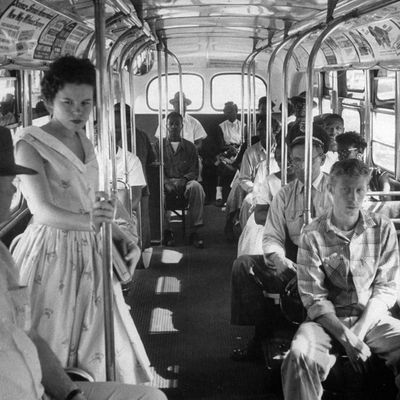
The angry debate that has broken out in response to the New York Times’ “1619 Project,” a set of essays in commemoration of the 400th anniversary of slavery coming to the 13 colonies, has mostly revolved around the question of whether the Founders’ vision was inherently and materially poisoned by the accommodations they made for slavery and its associate doctrines of white supremacy. With a fury that I wish he exhibited toward Donald Trump’s hourly lies and calumnies, National Review editor Rich Lowry thundered at the “odious and reductive lie” that slavery was fundamental to the Republic in its early days.
Personally, I find the backlash to this discussion almost entirely ridiculous, particularly coming from conservatives, who ought to be the first to acknowledge that the kind of limited-government paradise they long for and believe the Founders wanted has been from the beginning thwarted by slavery and racism. Perhaps I feel this way because I grew up in a police state governed, not by the Declaration of Independence or the U.S. Constitution, but by de jure and de facto apartheid.
In the Georgia of my early childhood there was no freedom of contract or of association if it violated the segregation laws; there was no freedom of religion if it allowed for “race-mixing”; there was no civil discourse on any issue ranging from public health to labor relations to sports and recreation that did not ultimately bend to considerations of race. It was an environment that made a mockery of constitutional government and an active evil of the Tenth Amendment and “states’ rights,” and begged to Almighty God for a big, socialistic federal government to vindicate the most basic of rights. How could any true conservative look back at that with anything other than horror?
Occasionally you find conservatives who do seem to get it. Back in 2015, Rick Perry, of all people, made a speech acknowledging that without the highly disruptive (to this day) 14th Amendment, “constitutional conservatism” — the endless plea for a return to the Founders’ model — was more or less a joke. And on Tuesday, conservative columnist Philip Klein went through the entire sorry history of race-tainted limited-government ideology:
The combination of slavery and the Jim Crow era simultaneously tainted arguments in favor of federalism, convinced many Americans that states could not be trusted with retaining too much power, and set precedents that paved the way for government intervention in other areas.
From both the text of the U.S. Constitution and other founding documents, it’s pretty clear that there was a significant resistance to overly broad central authority, one that persisted for decades. But ultimately, there was no way that the evil of slavery would ever be ended without federal intervention …
In the 12 years of Reconstruction, freed blacks exercised their rights to vote and even sent black representatives to Congress. But those gains were secured by the presence of federal troops who defended blacks from white violence. After the federal government pulled out in 1877, it ushered in nearly a century of state imposed discrimination and enabled a campaign of terrorism that deprived blacks of basic rights that, on paper, the post-Civil War amendments were supposed to guarantee.
It would take more federal intervention in the 1960s to unravel the Jim Crow system, during which time Southerners and their supporters once again invoked states’ rights arguments that, if adopted, would in practice have perpetuated the oppression of blacks.
Klein does not pause to note that fateful moment in 1964, when the Republican Party, led by Barry Goldwater, one of the founders of the modern conservative movement, embraced that states’-rights-based southern defense of Jim Crow and accelerated a realignment of the two major parties that would until this very day pit most conservatives against most of the descendants of slaves. Indeed, you can make a strong argument that conservatives have once again sacrificed their principles to the white fight against racial equality in aligning themselves with the most openly racist president since Woodrow Wilson, and one with significantly less fidelity than Wilson had to principles of free markets, civil liberties, the rule of law, and a rational world order.
A conservatism that could make its peace with America’s history of slavery and racism — past and present — likely wouldn’t veer into xenophobic frenzies, demonization of media and political rivals, oligarchical corruption, and other fascistic habits that owe so much to the racist terrorists of the old South, who behaved almost exactly like Donald J. Trump. Of course there’s more to America — its institutions, its principles, and its people — than can be encompassed by histories of racism. But this is a particularly odd time to pretend that racism’s legacy is a thing of the distant past, and alien to the country’s real meaning.






























